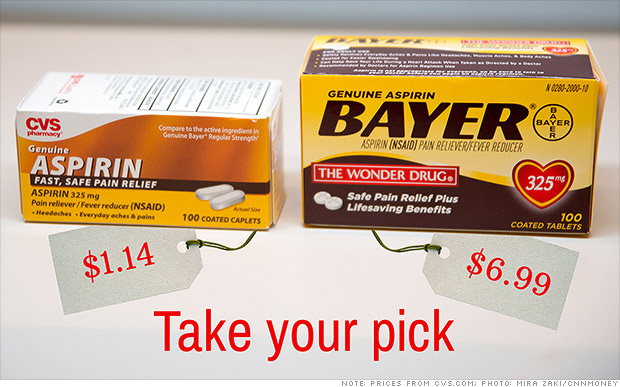Smart people buy generic brands
Sudafed or Wal-Phed: Which would you choose?
Nine times out
of 10, pharmacists and doctors will buy the generic version of aspirin,
rather than a brand-name like Bayer. Likewise, professional chefs
prefer store-brand sugar, salt and baking powder instead of brand name
ingredients.
In short, the most informed consumers usually buy generic products, claims a new paper by economists from Tilburg University in the Netherlands and the University of Chicago.
Their research estimates Americans are wasting about $44 billion a year
on name brands, when they could be buying the exact same products if
they switched to cheaper store brands. Store brand products cost on
average about half the price of national brands.
Take that bottle of aspirin for example. A 100-tablet package of 325 mg Bayer Aspirin costs $6.99 on CVS.com. The CVS version? Just $2.27 when it's regularly priced, and $1.14 when it's on sale.
They both have the same dosage, directions and active ingredient. But
about a quarter of sales on headache remedy drugs in the U.S. go to
brand-name products. So why then are some consumers paying so much for
Bayer?
The paper suggests ads are more likely to mislead all but the most
knowledgeable consumers. College-educated shoppers, for example, are
less likely to get duped into buying the more expensive brand-name than
the broader public. Meanwhile, the experts -- like pharmacists and
physicians -- are the least likely of all to buy the brand name drug.
Whereas the average household buys brand-name pain killers like Bayer,
Advil and Tylenol 26% of the time, pharmacists buy brand names only 9%
of the time.
A similar trend turns up at grocery stores.
Whereas the average consumer pays for brand-name salt, sugar and baking
powder 40% of the time, the most informed foodies -- professional chefs
-- only buy these brands 20% of the time,
The study used
Nielsen data tracking 77 million shopping trips by about 125,000
households. In addition to aspirin and baking supplies, it also tracked
groceries like milk and eggs, soda, and cereal, and other healthcare
products like cold remedies, bandages and contact lens solution.
Contact lens solution was the only healthcare product where the
smartest consumers perceive "true quality differences," the study said.











0 comments:
Post a Comment